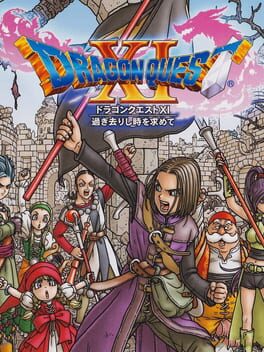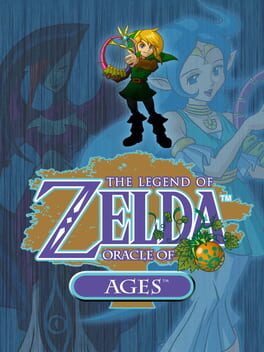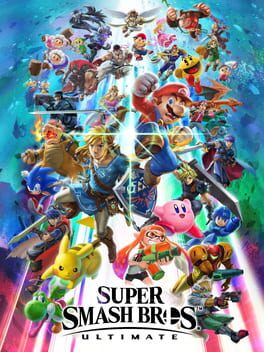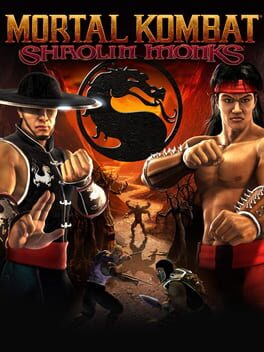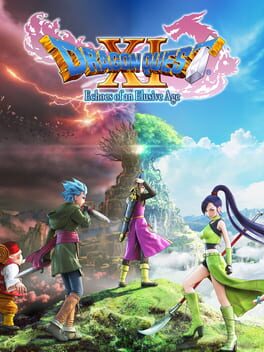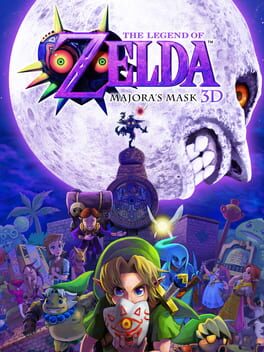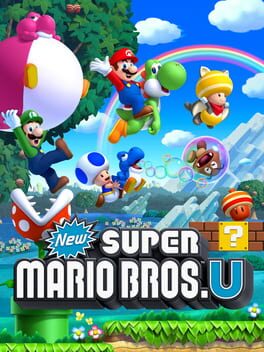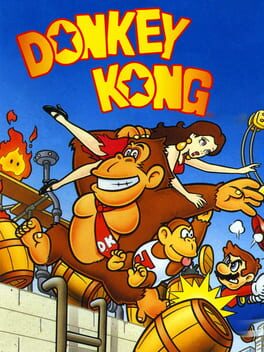Maurith
Nothing here!
Badges

Treasured
Gained 750+ total review likes

Famous
Gained 100+ followers

Adored
Gained 300+ total review likes

Trend Setter
Gained 50+ followers

Gone Gold
Received 5+ likes on a review while featured on the front page

Well Written
Gained 10+ likes on a single review

Early Access
Submitted feedback for a beta feature

Clearin your Calendar
Journaled games at least 15 days a month over a year

Pinged
Mentioned by another user

Loved
Gained 100+ total review likes

2 Years of Service
Being part of the Backloggd community for 2 years

Gamer
Played 250+ games

Full-Time
Journaled games once a day for a month straight

On Schedule
Journaled games once a day for a week straight

Busy Day
Journaled 5+ games in a single day

Popular
Gained 15+ followers

Liked
Gained 10+ total review likes

Donor
Liked 50+ reviews / lists

Organized
Created a list folder with 5+ lists

Shreked
Found the secret ogre page

Listed
Created 10+ public lists

Best Friends
Become mutual friends with at least 3 others

Noticed
Gained 3+ followers

Roadtrip
Voted for at least 3 features on the roadmap

N00b
Played 100+ games
300
Total Games Played
040
Played in 2024
074
Games Backloggd
Recently Played See More
Recently Reviewed See More
Before we begin, I'd just like to quickly highlight the parallels between this game and Link's Awakening. For starters, both are sequels to games considered "masterpieces" that instead of trying to imitate their greatness, they try to go beyond and stand on their own merits, in both we control the same incarnation of Link from the previous game, both take place in what is apparently a parallel dimension, and lastly, even though they may have a mostly goofy and illogical tone, this game having a somber tone while LA a more cheerful one, both share deep messages with allegories to fear of change and death. But well, let's start talking about Majora's Mask.
The story of this game begins shortly after the story of Ocarina of Time. Link embarks on an adventure to unknown lands in search of Navi, that friend who left us once she fulfilled her goal in the previous game. However, as fate would have it, we get caught up in a problem that traps us in a three-day time cycle forever... or at least it will be that way until we find a way to save the world, which will inevitably come to an end in that span of just three days (equivalent to just under an hour in reality). I especially like how immersive this introductory section is, as it puts a lot of pressure on you and makes you understand the danger the world is in firsthand. However, don't panic, even though the game has that 3-day limit, thanks to having possession of the ocarina of time, we can manipulate time as we please, giving us access to three songs; one that allows us to slow down time, another that allows you to jump through it and the last and most important, the song of time, which takes us back in time to the moment when all this mess started. So yes, you have a time limit, but anyway the game gives you enough time to play this adventure as you would play any other, I was able to fool around and explore at my leisure without any problems, and it's worth mentioning that I'm the kind of player who takes his time on everything.
I suppose you're still thinking that having a time limit ruins the game and makes it hellishly difficult, after all, Zelda games have a slow pace, one much like a JRPG, however, the three day cycle rather than a challenge, serves more to present a new approach to exploration and side-quests that can arise from the wide repertoire of NPCs that this game offers, but more on that later.
This game gives more importance to the masks, because while in Ocarina of Time they only served to obtain variations in the dialogues of some NPCs, in this game the masks are also used sometimes to give you small passive abilities, similar to the accessories in an RPG, which I like a lot, and although there are some masks that you only use once in the whole game, masks like the kamikaze or the bunny hood were quite good and convenient.
Speaking of one of the main innovations of this game, we have the transformations. Probably since Ocarina of Time the developers realized how limited it could be to have a human with realistic movements to make a more creative gameplay, because you can't really invent things that a human can do, so in this game the transformation masks are introduced, which expand Link's movements and game mechanics, being the forms we can get nothing more and nothing less than that of a Zora (fish man), a Goron (rock man), and a Deku (plant boy).
As for the "main" content that are the temples, this game offers few, and you may think that this hurts the game, but the truth is that no, because the amount of optional content that there is more than makes up for it. But talking about the temples themselves, they are quite good, a bit more complicated compared to other games, but each one offering the traditional structure of getting an item and setting puzzles around it, but not only that, because each temple makes you use each of the transformations, so that in fact the temples are designed around both, the item and the new transformation. My favorite temple is the fourth one, one of the best in the series without a doubt.
Another thing I like about this game is that there are no golden Skulltulas, instead, each temple now has 15 fairies hidden in it, which when you collect them all together will give you a permanent magic upgrade. Needless to say, I prefer this, as it makes exploring each temple more interesting and even though finding some of these fairies can be tricky, they are all hidden just right.
It may seem that this game has fewer items than other Zelda games because there are only 4 temples, but many classic items are not really gone, but are included in the same Link transformations, as the Goron is as if you had the hammer with how strong and heavy it is (or the pegasus boots for giving you a lot of travel speed), the Zora gives you something like the boomerang and a replacement more than superior to the iron boots. In that sense, the transformations are very cool, as they not only change the way you move around the world (being a considerable improvement over Ocarina of Time), but also have their own useful abilities.
But well, let's talk about the real main attraction of the game, which is the 3-day cycle, the aspect that makes this game special, but also imperfect. What really makes it shine is how this system was leveraged to give a little story to each of the NPCs in this game. Unlike previous installments, Majora's Mask gives a greater emphasis on the day to day life of the NPCs, so you will have to pay attention to them, as there are some that have different behaviors depending on the day, time and place. Many of the NPCs are directly re-used from Ocarina of Time, so they will be somewhat familiar to you, but I think the developers of this title took advantage of that factor to give them more distinct situations and personalities. Each one has a problem and helping them will usually reward you with a piece of heart or a mask, or rarely even better things. What's entertaining here is how peculiar and diverse the situations and people we can encounter are. Finding weird NPCs has always been a common thing in Zelda games, but I especially like how for the first time in the series a lot more attention was given to this aspect of the game, they end up making this title particularly very memorable.
The map is smaller compared to Ocarina of Time, and it certainly may seem more linear at first glance for only having 5 areas, but the truth is that there are too many things you can do apart from overcoming the temples to entertain you. Majora's Mask is masterful at giving you plenty of puzzles and challenges that are intuitive and satisfying to complete. Although the scale of the game is smaller in comparison to Ocarina of Time, that adventure and discovery factor that is so characteristic of the series is not sacrificed at all, in fact, in some ways I feel it was enhanced.
In fact, as different as this game may feel from the rest of the series, even its music is there to remind us that this is a true adventure on par with all the other games, with the main theme being a reversion of the classic Overworld theme. The music in this game is great, as it has a certain tetric and chaotic aura, while at other times it can be very calm and even full of melancholy... Although many melodies from Ocarina of Time are reused, the new tracks make up for it by how good they are.
Going back to the 3-day cycle, every time it is restarted you lose your money, unimportant items like ammo, sticks, or nuts, which is not as bad as it sounds, because fortunately the game is fair in terms of what you lose and what you don't lose in each restart, since important things like items or masks you will always keep.
However, the real problem that arises from the 3-day system is the repetition. And although I like that the game is made so that each cycle is different and unique, in a way it makes you take everything with more frivolity, because you are helping people that you know that once you restart the cycle, they will have exactly and again the same problems that you had already solved, and although it sounds like a minor detail, for me this actually breaks a little with the immersion, because I am no longer helping people to solve their problems, but just to get something. And this can become more tedious when you take into account that failing or taking a side quest at the wrong time sometimes means having to repeat it from the beginning. Also when you finish a temple, the curse of that area will be dispelled, but it will return once you restart the cycle, which makes you have to defeat the boss of each temple every time you want to break the curses again (there are some side-quests that require it). This to me also breaks a bit with the logic of this universe, because there are things like the bank that make your money be kept even if you restart the cycle, but on the other hand, why do the bosses of each temple revive even though the mask they give you (proof that they were defeated) you will always keep it?
But... speaking again about a positive aspect of the concept of the 3-day cycle, I like the fact that, even if you have already completed everything in the game, you can replay the parts you liked the most at any time you want without having to create a new file, not something you can do in all games, but in this one thanks to the very nature of the cycle. In addition, living in Termina becomes somehow a daily thing, and little by little, both the place and its inhabitants, become part of you.
Anyway, changing the subject, this remake is pretty good, although it has some questionable changes, but I think I understand, Eiji Aonuma believed that some things from Majora's Mask needed to be changed to make this game a more "suitable" one. However, it's well known that many of these changes were for the worse, and while I don't think they ruin the experience entirely, I understand where the hate from hardcore fans comes from. Be that as it may, the remake also introduces many quality of life improvements and in some ways (just some) feels like a more polished remake than Ocarina of Time. If you want to play this version, go ahead, and if you want to make it even better, use the restoration patch, which modifies some things of this remake to make it more like the original version, but keeping all the good changes of this remake, also adding more quality of life improvements that were not in the original version, nor in this remake.
And well, what to say, if it wasn't for the changes that Eiji Aonuma asked Grezzo, I think this would be one of the best remakes, because the updated graphics make the game look more beautiful and attached to the art style that was portrayed in the concept art, it also adds a lot of detail and color to the scenarios, which makes that unlike the original version, the reuse of assets from Ocarina of Time is considerably less. The downside of the graphical update is that many people don't like it, as the low quality textures and low-poly models, as well as the muted colors of the Nintendo 64 version are for many a fundamental aspect of the experience. In my opinion, again, I don't think they ruin the atmosphere of the game, as I quite liked it, so I think it all depends more on personal preference. The graphic style of Ocarina of Time 3D is great, and I like how this game is just a continuation of that style in many ways.
Conclusion
Majora's Mask is truly brilliant. I love how cleverly the exploration and side-quests are designed, they make it a game rich and varied in content, as well as the approach and often evolution that gives many of the mechanics and concepts established in previous titles end up making it a very outstanding installment.
I don't know how to say it, but it depresses me that there will never be a game like this again. Although the 3-day cycle makes it an imperfect title, it also makes it a very special game like no other.
Additional comments related to the review
I played using the restoration patch made by Project Restoration, which can be found at the following link: https://restoration.zora.re
What to say... in terms of presentation, it feels like an HD version of New Super Mario Bros. Wii (remembering that the Wii one already felt like an HD version of the DS game), the worlds follow the same themes and it's broadly speaking exactly the same art style, but a bit more refined. I won't deny that the game looks good and has a nice, colorful art style (my favorite parts being the cloud worlds). It's the most polished of all the "New" Super Mario titles in fact, but still, there are some things that look dated, like how stiff and expressionless the character models are, or the fact that most of the assets in this game like for example the backgrounds of the stages are PNGs and not real 3D models. In that sense, although the game complies and looks good, it leaves a little to be desired, because being the Wii U comparable in power to a PS3, it's a little sad that this game looks like a remastered Wii title. It also doesn't help that almost all the soundtrack is reused from previous games, which is a bit tiring considering that New Super Mario Bros. 2 did exactly the same, and this really bothers me a lot, because completely new songs was something to be expected, but unfortunately only the main theme is new.
I guess at least it's a good Mario game, in fact maybe the one I've enjoyed the most from the "New" series. The level design is good and the highlight of this game, you can tell that inspiration was taken from the level design philosophy of Super Mario 3D Land for some of the stages, as some of these are designed around a theme. For example, one level may be entirely about swinging platforms, another may be about going on water spheres, and so on. In itself, this game doesn't present anything we haven't seen before to tell you the truth, but in terms of levels it's pretty solid, not to mention that getting all the star coins is still a lot of fun and my favorite part of these titles.
As news, we have very few, but I'll talk about them anyway. New Super Mario Bros for DS was entirely inspired by the first SMB, the Wii title took inspiration from SMB3, so naturally, this game takes inspiration from Super Mario World. The new Power Up in this release is the super acorn, which although it doesn't allow you to fly like the cape, it does give you the ability to glide through the air at high speed, allows you to stick to walls and also gives you a kind of double jump, and although it's not the most impressive power up, it's certainly the best of all those introduced so far since Super Mario World. There are also some levels that are themed around carrying a baby Yoshi that has special powers, such as spitting bubbles that we can jump on or lighting the way in dark levels, although the amount of these types of levels isn't that great, I guess I appreciate the attempt to want to bring back the colored Yoshis, even if it's only as a momentary gimmick for a few levels. The level selection map is now a large map that interconnects all the zones similar to Mario World, it certainly doesn't have the same charm, but I like that this style of map has been brought back.
Conclusion
Needless to say, it's a Mario game, it's good. However, as a game to start a new generation of consoles it falls quite short, because when it comes down to it, this game feels like a product that was cheap and easy to produce. And truth be told, this is a bit embarrassing, as Mario is Nintendo's most important character and their games should have a bit more ambition and love in them, even though I like this game, I completely understand where the hatred towards it comes from. I think that, if Nintendo had put a little more effort in renewing the presentation of this game, we would be in front of one of the most memorable Mario games, because in terms of level design is quite solid, but the fact that it feels, looks and plays the same as the previous 3 games really end up hurting this game.
And having said that... I admit I enjoyed it a ton haha, I don't love the "New" series to death, but they are games I enjoy quite a bit, and this one has possibly become my favorite of the bunch.
The game starts identically to the original Donkey Kong, with the 4 classic levels, the same sounds, practically the same sprites, and the same objective, to save Pauline, however, when you finish these levels, it is revealed that this is just the introduction of a completely original game with 101 stages, which is much more interesting and mechanically creative. The gameplay is completely revamped, being a sort of combination of the original Donkey Kong, Donkey Kong Jr., Super Mario Bros. 2 (USA) and a few more additions to Mario's moveset that make it extremely satisfying to control. This game is a precursor to Super Mario 64 in many ways, as you can perform other types of jumps depending on whether you're crouching or make the jump immediately by flipping to the opposite direction, which like in SM64, serve to reward the more skilled players by conveniently using these moves to skip sections of the levels. I've always loved this sort of thing, as it means that newcomers can play the game with simplicity and gradually learn the gameplay mechanics, but those who want to try to push the envelope and skip the easy parts quickly can do so as well.
This is one of the few games that really understands the console it is made for, meaning that the graphics and length of the levels are meant for a handheld console that you will most likely only play in short sessions. So in other words, this game consists of a series of small levels, each with a unique puzzle and platforming challenge, whose duration can range from over a minute to just a few seconds, making them a perfect snack for those dead moments. And this game is really very creative when it comes to level design and mechanics, as each level has its own little gimmick, all starting from the same basics of getting a key to the goal. There are levels where we are literally allowed to place platforms or stairs at our whim, or others where you must wisely use the elements of the stage to reach the goal.
Conclusion
And what can I say, I loved it, it was a very short game (about 4 hours), but also a very pleasant one to play and full of pure fun. It overflows charm and you can tell it was made by a team with ambition that understood the console for which the game was being created, which ends up making it not only an excellent tribute to one of Nintendo's first franchises, but an excellent Game Boy game in general.
This has become my second favorite Game Boy title, only being surpassed by Link's Awakening, but it's still really very good and I recommend it to any fan of retro Mario games. It's a pity that even though it received a sequel (Mario vs. Donkey Kong), other than that, Nintendo doesn't give much recognition to this game.
